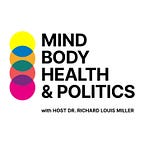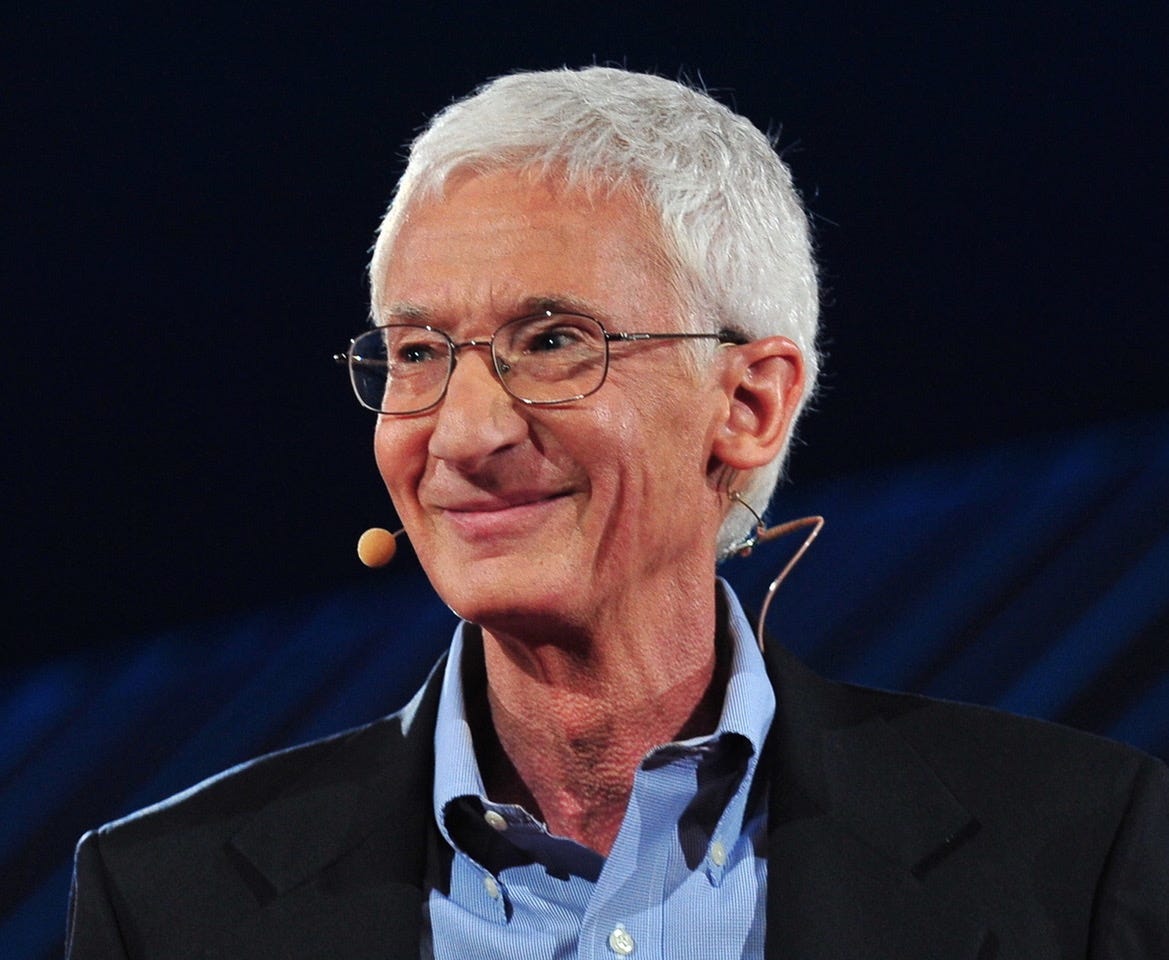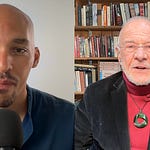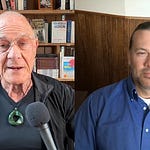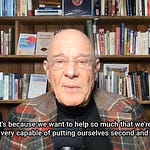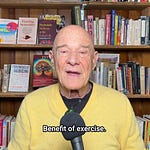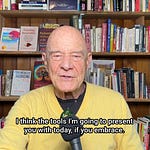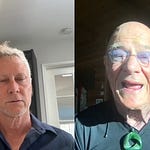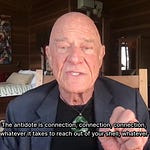Dear listeners,
I'm honored to be with you today to celebrate the life and legacy of Dr. Roland Griffiths, a true pioneer in the field of psychedelic medicine.
When Presidents Nixon and Reagan ramped up the War on Drugs in the 1970s and 80s, they made psychedelics like LSD, psilocybin, and MDMA illegal - not for public health reasons, but to target marginalized groups like African Americans and anti-war protesters. This effectively shut down promising psychedelic research for over 50 years.
But Dr. Griffiths persisted. In the face of career risks and stigma, he knocked on the doors of government agencies asking permission to study these substances. His courage paid off in 2006 when he published groundbreaking research on using psilocybin to treat anxiety and depression.
Back in 2014, I had the privilege of interviewing Dr. Griffiths for my book on Psychedelic Medicine, along with his research assistant at the time Katherine MacLean. In that early interview, Griffiths and MacLean described how just a few psilocybin sessions yielded dramatic, long-lasting relief of depressive symptoms in participants. This was a pivotal study that helped spur the psychedelic renaissance happening today.
We owe immense gratitude to Dr. Griffiths, his colleague Dr. Katherine McLean, and the many scientists at Johns Hopkins and elsewhere who have advanced our understanding of psychedelics as tools for healing. Their work has opened doors of curiosity, compassion and wonder that had long been shut by misguided policies.
You can learn more about Dr. Roland Griffiths’ life, research, and legacy in this New York Times obituary, or by listening to this encore presentation of our first interview.
Thank you, Dr. Griffiths, for your perseverance and bravery. May your spirit of scientific inquiry and service to humanity continue lighting the way for others. The ripples of your contributions are only beginning to be felt, and they will surely grow into waves of insight, empathy, and healing.
May you be surrounded by golden light,
Dr. Richard Louis Miller
Links and Resources
Katherine MacLean - Website of Katherine MacLean, research assistant to Dr. Griffiths
New York Times obituary - Obituary of Dr. Roland Griffiths
Psychedelic Medicine by Dr. Richard Louis Miller
Multidisciplinary Association for Psychedelic Studies (MAPS)
Good Friday Experiment - Experiment mentioned in the text
Seeking Psychedelic Testimonials: The Good, the Bad, and the Ugly.
We are currently looking for first-hand accounts of adverse effects of psychedelics—from ‘bad trips,’ to unwanted physiological complications, to abusive practices by guides, therapists, and shamans.
The interviews from this series will go into a forthcoming book on the topic—perhaps the first book its kind.
Please contact me if you would like to be interviewed. You can also leave us a voice message to share your story. We will keep your information anonymous unless you tell us otherwise.
Transcript - Spiritual Psychopharmacology
January 16, 2014
Roland Griffiths, PhD, is a psychopharmacologist and professor at Johns Hopkins University in the Departments of Psychiatry and Neuroscience. Dr. Griffiths psychopharmacology research has been at the cutting-edge of neuroscience for over 40 years. He also has a long-term meditation practice. Katherine MacLean, PhD is an academically trained research scientist and meditation practitioner with a long-standing interest in the brain, consciousness and the science of well-being. As a graduate student at the University of California, Davis, Katherine was supported by a prestigious National Science Foundation research fellowship to study the effects of intensive meditation training on concentration, emotional well-being and brain function.
Breaking the Taboo
Opening the Research Vaults
Dr. Richard L. Miller (RLM): Not long ago, I hosted two panels at an international conference, the 25th anniversary of the Multidisciplinary Association for Psychedelic Studies (MAPS). There aren't many scientists around the world – and certainly not in this country – who have done research on psychedelic medicines, because the United States government has made it extremely difficult to do. That is most unfortunate.
People like Dr. Roland Griffiths and Dr. Katherine MacLean are taking a risk with their careers by doing this kind of research. We live in a world where research can subject you to various kinds of scrutiny – whether it's from the U.S. government or your own academic colleagues. These folks should be applauded for their research and for bringing the information to us.
Let me read something to you by Dave Nichols, who was on our program a few weeks ago. He's at the Department of Medicinal Chemistry and Molecular Pharmacology at Purdue University. Here's what Dave had to say about Roland's initial 2006 research on psilocybin, "Psilocybin can occasion mystical experiences having substantial and sustained personal meaning and spiritual significance":
“The article by Griffiths et al. in this issue of Psychopharmacology should make all scientists interested in human psychopharmacology sit up and take notice. It is the first well-designed, placebo-controlled, clinical study in more than four decades to examine the psychological consequences of the effects of the hallucinogenic (psychedelic) agent known as psilocybin. In fact, one would be hard pressed to find a single study of psychedelics from any earlier era that was as well done or as meaningful. Perhaps more importantly, despite the notion by many people that psychedelics are nothing more than troublesome drugs of abuse, the present study convincingly demonstrates that, when used appropriately, these compounds can produce remarkable, possibly beneficial, effects that certainly deserve further study.”
Harriet de Wit of the Department of Psychiatry at the University of Chicago says:
“People have long sought meaning and significance in their lives through a variety of spiritual practices including prayer, fasting, chanting, solitude, and meditation. Historically, some of these practices have included the use of certain psychoactive plants. A common theme of these experiences, with or without the aid of psychoactive agents, has been to free oneself of the bounds of everyday perception and thought in a search for universal truths and enlightenment. To a large extent, this type of subjective and uniquely human experience has enjoyed little credibility in the mainstream scientific world and, thus, has been given little scientific attention. However, it may be time now to recognize these extraordinary subjective experiences, even if they are, at present, not directly verifiable by objective measures and even if they sometimes involve claims about ultimate realities that lie outside the purview of science.”
She goes on to say that the article by Griffiths et al., describes one of the first attempts to study these experiences in a systematic scientific investigation. She applauds the study, and talks about how it's rigorous; how it includes controlled double-blind administration; how it was the first study conducted in a specifically designed environment; and on and on. There are more articles applauding this research and the rigor of the research.
Seeking Approval Among Skeptics
Defining Spirituality
RLM: Welcome, Dr. Roland Griffiths and Dr. Katherine MacLean. What's the beginning of this story of this groundbreaking research on psilocybin?
Roland Griffiths (RG): I'm a psychopharmacologist. I study mood-altering drugs, and have been doing so at Johns Hopkins over 40 years. About 20 years ago I took up a meditation practice that opened for me a fascinating window into the nature of spiritual experience, and it got me asking questions about spiritual transformation. I became very intrigued with meditation, the nature of spirituality, and comparative religion in a way that I never had been before.
I was studying mostly drugs of abuse, so there wasn't an immediate connection to psychedelics until I was reminded of the work conducted back, mostly in the 1950s and 1960s, with a whole class of classic hallucinogens – LSD-like serotonergically-mediated hallucinogens, including LSD, psilocybin, mescaline, and DMT (the active ingredient in ayahuasca). There had been at least one very seminal study from the 1960s, the so-called Good Friday Experiment, in which psilocybin was said to have occasioned religious-like experiences in seminary students …
RLM: What does that mean when you use words like "religious-like experience" or the word "spirituality"?
RG: [Laughing] Spirituality is one of those words that I use frequently and actually choose not to define. It's like a projective test – people end up talking about whatever their personal thoughts of spirituality are. But I can talk about the primary mystical experience, and that's what our research has largely focused in on. Let me tell you about the setting and condition in which we give psilocybin, and then I'll describe the core of this experience, which also relates to our belief in the potential therapeutic importance of these compounds.


